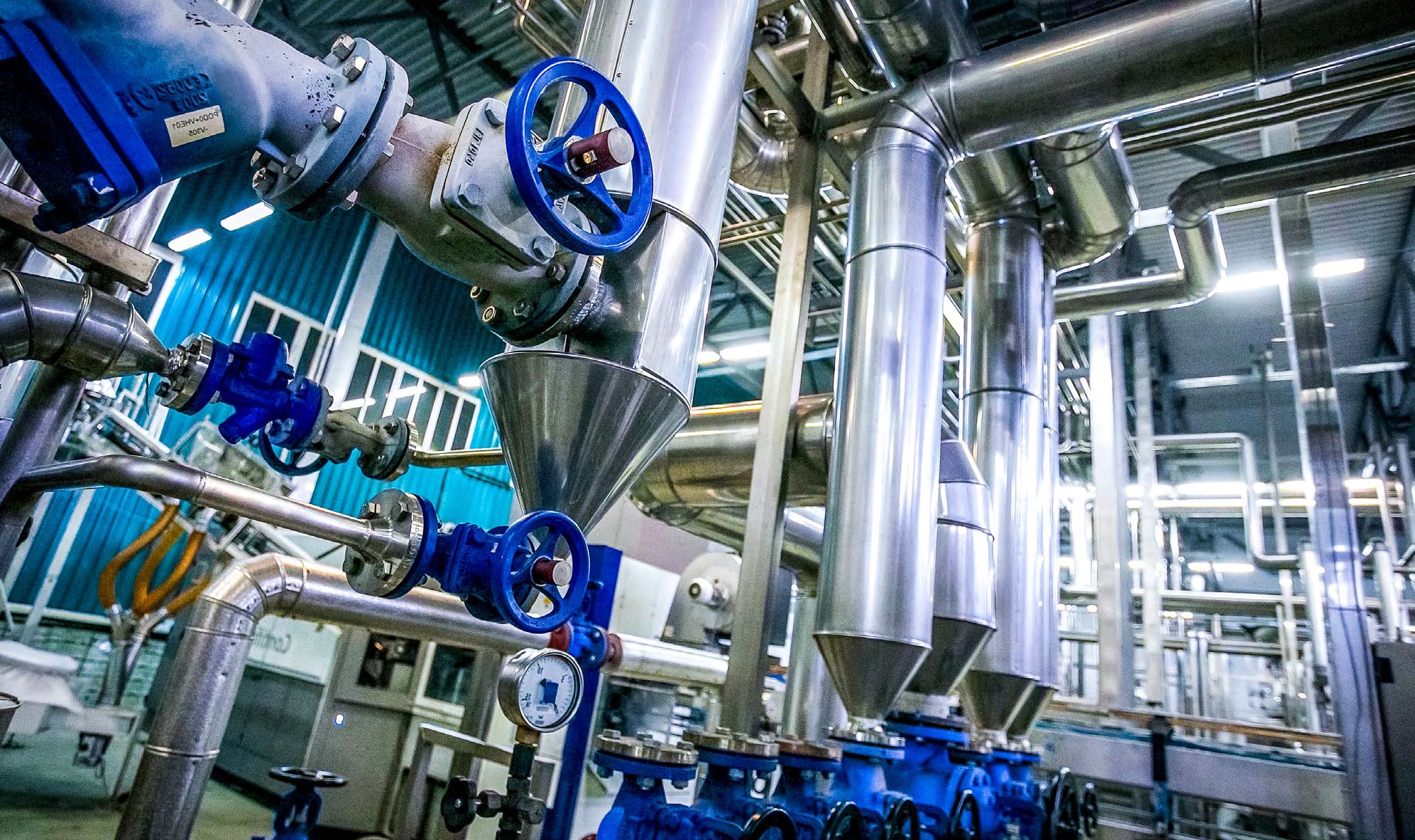
11 minute read
Control Union
PROJECT DIRECTED BY Connor Love
WRITTEN BY Romana Moares
Control Union UK

Certified Sustainability
With sustainability becoming one of the key topics across all industries, companies need an experienced and reputable body to help them achieve their sustainability goals. This is where Control Union UK comes into the picture: offering a wide spectrum of independent services including certification, auditing, inspections, and others, the company plays an irreplaceable role in today’s world.
Control Union UK is part of the Peterson Control Union group, which has been operating in logistics, quality, certification and risk management for over 100 years. Its in-depth knowledge and experience cover all aspects of the supply chain in many industries, including agriculture, plastics, biofuels, fisheries, textiles, and many other sectors. The company has a strong footing in the UK - Control Union UK has a presence across the whole of country, with offices in London, Lymington and Aberdeen, and other staff based throughout the UK. “We work with companies of all sizes to support them in achieving their sustainability goals. We assist them in implementing the sustainable sourcing approach which best suits them, through certifications as well as tailored sustainability programmes,” says Managing Director Franco Costantini.
Control Union UK
Trusted partner
He explains that the group of which Control Union UK is a part operates around the world, drawing on its century-long experience and expertise. “In 2020, we celebrated our 100th anniversary.”
“Over the years, the company has been expanding the range of services it provides as well as the sectors in which it operates. Today, we provide certifications, inspections and advisory to our customers from a range of industries from food to bio energy and, increasingly, across their whole supply chains.”
Certification services range from fisheries to sustainable palm oil, fair trade to plastic-free, and the company continues to develop its already wide offering. “At the moment, we offer over 100 certification programmes, all of them related to sustainability, with a view to offering support to organisations in achieving their sustainability goals; assistance with defining sustainability policies and reducing their environmental footprint,” says Federica Cionci, Project Manager for Plastics, Textiles and Recycling certifications. “We take time to understand our customers’ needs, to ensure that our carefully considered solution is the most appropriate for their business. The aim is to move them to a more sustainable operation, and of course, we also help them to set their measurement systems so that they can see how their sustainability goals are being achieved.”
The group employs some 5,000 people in its office in 80 countries. Mr Costantini points out that the standards and requirements are constantly evolving, so it is key to keep pace with environmental regulations and developments across industries, as more data and more scientific proofs are available to develop innovative solutions.
Teams from across all 80 countries collaborate to ensure that they remain at the forefront of these developments, and the company offers regular webinars and training to keep their clients equally informed.


Sustainability Feature
One of a kind
Control Union stands out as a dynamic, energetic organisation with a structure which allows for fast development, to implement and to scale up services very effectively and efficiently across the board. “Innovation is another important characteristic of Control Union. We are always on the lookout for innovative services as industries increasingly need enhanced ways of tackling sustainability. We try always to be a step ahead in order to develop and offer an innovative approach,” affirms Mr Costantini.
“So many organisations source products or services locally and internationally, so in order to meet their own goals, they need to make sure that their suppliers meet their expectations in terms of the environmental impact of products. This can mean for example eliminating sources related to deforestation and making sure farming is done according to environmental requirements, or that recyclable materials are used. For example, we have a range of plastics certifications to help businesses reduce their plastics impact,” says Federica Cionci. The company uses a wide pool of knowledge acquired over more than a century, and its expertise is one of its clear differentiators. “To find the right people with the right type of knowledge, especially in sectors that are continuously developing, is naturally a challenge,” says Mr Costantini. “We always try to cross-train colleagues, so that they gain experience in different perspectives. For me personally, this is one of the most exciting aspects of Control Union.”

Control Union UK’s plastics certifications help businesses reduce their plastics impact
Control Union UK

Control Union UK


Franco Costantini
Franco joined Control Union (UK) in 2016 as Managing Director. He has worked for some 15 years in the Testing, Inspections and Certifications sector, across a range of industries including agri-food, consumer products, industrial. Franco holds a Master of Business Administration (MBA), a post-grad Research Masters (M.Res) in Fluid Dynamics and a Master of Engineering (M.Eng) in Mechanical Engineering.
Frederica Cionci

Federica has a background in marine research, obtaining her BSc degree in environmental science and MSc in marine biology from the University of Pisa. She joined Control Union UK in 2018 and progressed to project coordinator in 2019 managing the administrative aspects of a number of certification programmes, developing and promoting new certification schemes focused on different aspects of sustainability, and also coordinating new projects such as training courses and webinars.
Sustainability Feature
Meeting the market challenges
As any other company from any sector, Control Union has had to deal with the restrictions and impact of the global pandemic over the last two years. Uncertainty has been the biggest challenge. “Anything that brings obstacles to trade, obstacles to movement, is not good for business. On the other hand, the pandemic has also brought about some opportunities, specifically in terms of digitisation and the need to develop new ways of working,” notes Mr Costantini.
“Before Covid-19, our services were mostly provided in person at the client’s facilities. Now, we combine the remote approach with a physical presence, saving time and money for all. The crisis gave us a push to look internally and see what can be improved.”
But the pandemic has not been the only game changer. Brexit has also brought challenges around the uncertainty in UK trade and commerce, specifically in agriculture, but also cargo inspections.
He acknowledges that in the UK, a lot of agricultural organisations are waiting at the moment to decide exactly what their strategy is going to be and how they’re going to run their operations in the next 10–20 years. “Companies are waiting to see what the government does exactly around subsidies and policies for supporting environmentally friendly agriculture in the UK. As a result, we are actually seeing some of our agricultural schemes growing more quickly outside of the UK at the moment, but hoping that a real opportunity will come in the UK as that settles down, and policies become clearer, enabling more rapid growth for agricultural initiatives on home soil.”
However, Control Union has not stood still. In February, the company was accredited as an approved body for UKCA marking, a product marking used for certain goods being placed on the market in Great Britain, often termed ‘New Approach’ goods, to replace the CE marking.
Sustainability Feature
Regenerative agriculture
Agriculture is another area where impressive progress has been achieved on a global scale. At the end of last year, the regenagri team from Control Union UK were invited to contribute to a meeting with the United Nations Environmental Program’s (UNEP) internal task force on Sustainable Food Systems and Resilient Agriculture. Control Union presented the regenagri programme to the UNEP team, focusing on how regenerative practices and outcomes can be measured and monitored through the regenagri programme.
“Regenagri is our regenerative agriculture initiative, and one of our key areas for growth in 2022. Through the scheme we certify that food or fibre is being produced on a farm that is managed in a way that actively regenerates the land – increasing soil health and biodiversity, improving water management and sequestering carbon from the atmosphere back into the soil,” says Mr Costantini.
“Regenerative farming has become crucial around the world to reverse the environmental impact of agriculture and to enhance ecosystems. We’re seeing a significant rise in demand for regeneratively farmed produce from both the food and textiles industries.” Control Union has worked with many companies across the globe under the regenagri programme. A good example is the grain production company Scheffer. The partnership between Scheffer and Control union began in 2020 when Scheffer were the first Brazilian company to be certified by Control Union for their regenerative farming practices.
The partnership will continue as a joint effort to create more awareness globally of regenerative farming practices and will enforce and straighten supply chains to align with the regenerative strategy. “The key point is we are trying to make is for brands to care for their supply chains and how they can be more sustainable,” says Mr Costantini.
“With COP26 still fresh in our minds, it is vital to remember that climate change and biodiversity are intrinsically interlinked, and both are vital to the future health of our planet. In this respect, we will be working with our clients to scale up the implementation of regenerative programmes,” he concludes.
uk.controlunion.com

Control Union UK
Candiani
Candiani x regenagri® Content Standard
Italian mill Candiani SpA is at the forefront of innovation and sustainability in the denim industry. Candiani is recognized as among the first to utilize responsibly sourced cotton fibers, dyes, and clean technologies. It is also working to reduce water and energy consumption in the manufacturing process while replacing harmful chemicals, a widespread issue in denim production. In November 2019, the company revealed its revolutionary COREVA™technology, the world’s first fully biodegradable stretch denim, created with R&D partner DENHAM and now being used by global brands.
Now, Candiani is reaching back through the value chain to focus on regenerative agriculture, particularly regenerative cotton. Candiani has become the first company to be certified with regenagri’s® chain of custody Content Standard. The Content Standard certification was launched in June 2020 by Control Union, an independent inspection body, helping businesses define, measure, and achieve their sustainability goals. Control Union aims to establish the regenagri® chain of custody Content Standard as the global industry standard for regeneratively grown fibers. It monitors and ensures identification, traceability and segregation of elements to ensure no cross contamination between regenerative materials and conventional.
Regenerative agriculture is considered the new frontier and a fundamental transition for the fashion industry. Regenerative agriculture has yet to be universally defined. Surprisingly, many stress that this is probably a good thing. The very foundation of regenerative agriculture is extremely site and context specific. While outcomes may vary from farm to farm, many benefits associated with regenerative practices have been documented. A strong focus on soil health leads to such benefits as an increase in biodiversity above and below ground, an increase in nutrient and water efficiency, and the capability to store more carbon in the soil, offering a potential solution to climate change. regenagri® is a regenerative agriculture initiative which aims at securing the health of the land and the wealth of those who live on it by offering a holistic approach that looks at the entire farming operation. It seeks to maximize the positive benefits of regenerative agriculture in a measurable way. Farms and the companies in their supply chain can benefit from support to transition to a regenerative approach, measurement, analysis and sharing of on farm data through the digital hub, certification against the regenagri® standard criteria and carbon verification.
The regenagri® Content Standard focuses on continuous improvement of ecological outcomes rather than maintaining a status quo. This strive for continuous improvement is partly why Candiani has chosen to partner with regenagri®. Candiani believes it gets to the heart of regenerative agriculture and makes the standard very farmer friendly. Most importantly for Candiani it also supports farms and organizations with a complete solution to facilitate the continued adoption of regenerative farming methods.
“We believe in a future where regeneratively grown cotton is the industry standard’ says Alberto Candiani, Global Manager of Candiani, about this significant partnership, “We are happy to be the first to partner with regenagri® to support this transition and consider them to be the best positioned to advance the widespread adoption and comprehensive verification of regenerative practices.”

candianidenim.it regenagri.org










